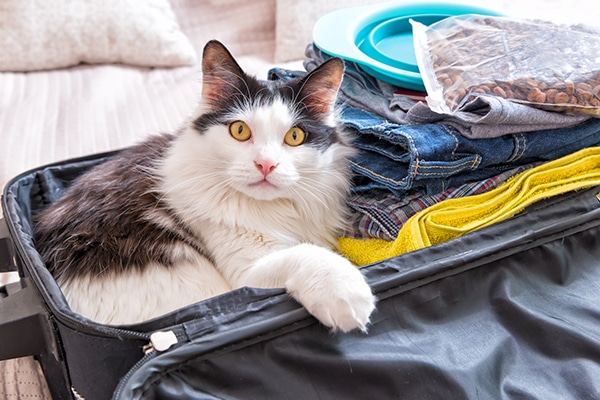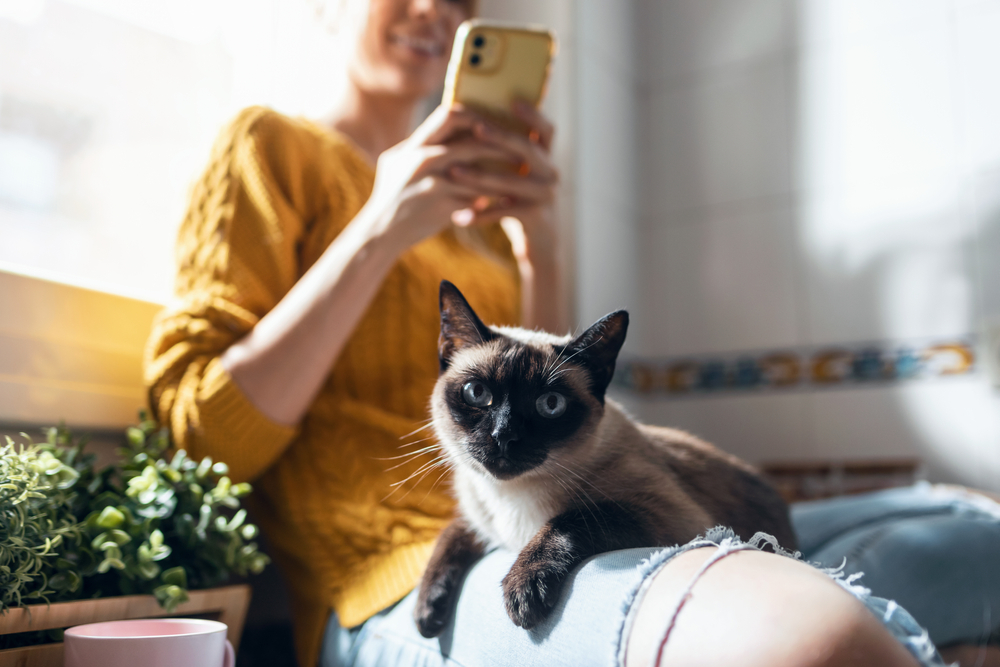As much as we’d all love to stay home with our cats 24/7/365, this just isn’t a reality for most of us. Whether we’re going away for work or treating ourselves to holidays, there will inevitably come a time when you’ll need to leave your cat at home. It’s normal to feel worried about your fur baby while you’re away, but with some forethought and preparations, you’ll be able to leave your kitty at home with some peace of mind. Read on to find our 12 holiday cat care tips so you can enjoy your getaway without missing your sweetie pie too much.
The 12 Holiday Cat Care Tips
1. Determine the Level of Care Required
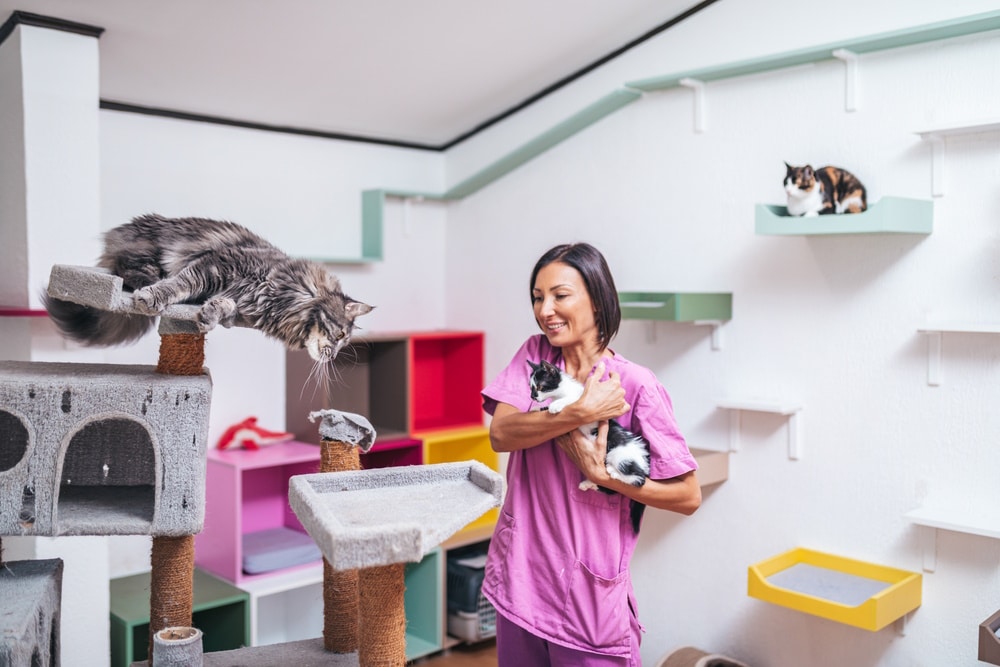
Unless you’re going away for a night or two, your pets will need some level of care in your absence. Whether you’re enlisting the help of a friend or family member or hiring a cat sitter, someone will need to come to your home to look after your cats while you’re away. They don’t need to spend the entire trip at your home, as once or twice daily visits will suffice for most cats. However, if you have a special needs cat or one that requires medication, you may wish to have more frequent visits.
Generally speaking, most cats do better when they can stay at home versus going to a boarding facility. However, we realize this is only realistic for some cat owners. It’s better to have your pets cared for at a boarding facility than to leave them home alone to fend for themselves.
2. Choose the Right Facility
If you decide that boarding is the best option for you and your cat, there are several things you should consider before selecting a facility.
- Spaciousness. Your cat will spend most of their time in their cat condo. It needs to be large enough to give your pet space to hide, explore, and climb. Additionally, feeding and litter box areas should be separated.
- Dog-Free Zone. Most boarding facilities will board animals of all shapes and sizes. It’s in your cat’s best interest to ensure that the space the facility has for cats is separated from the one they have for dogs. Dogs can be loud, and if your kitty is an indoor-only animal, they may never have heard barking before. It may be frightening and stressful for your kitty to share a space with another animal, especially a dog.
- Assess the Facility. Do a walkthrough of the facility and meet the staff before deciding if it’s right for you and your cats. Take a mental note of any red flags you see during your tour, and remember them when choosing the facility.
- Multi-pet Housing. If you have more than one cat, and they get on well, be sure the facility you choose will allow them to be housed together. It’ll be far less stressful for your pets if they’re together rather than ripped apart and put into a strange place they’ve never been before.
3. Choose the Right Pet Sitter
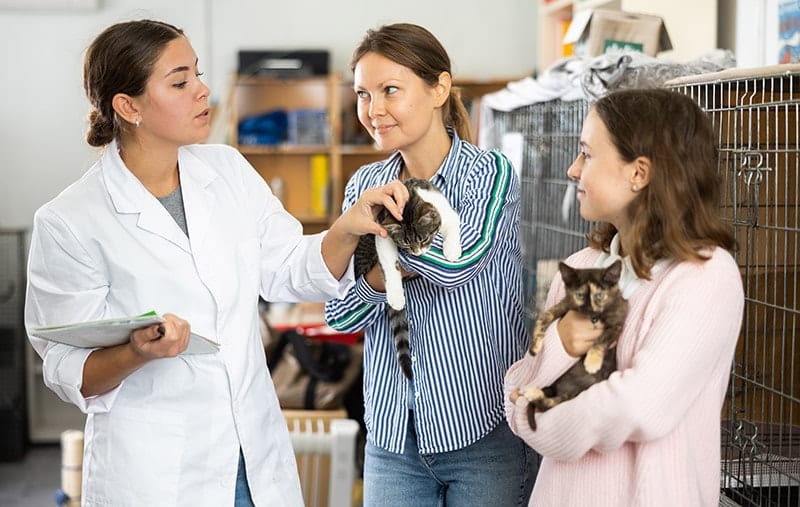
If you decide that a pet sitter is the best option for your kitty, there are several things to know about choosing the best one.
- Ask for recommendations. Ask your friends and family members if they have used any local pet sitter’s services in the past and their thoughts on the level of care. You can also ask your veterinary clinic if they have recommendations or even check bulletin boards at your local pet store.
- Meet face-to-face. You shouldn’t ever hire someone to care for your pets (and, ultimately, your home) that you haven’t met in person. Have a list of questions readily available for the interview, with questions pertaining to their fees, level of experience, and how long they’ve been in the business. The goal is to get a good feel for this person and to see if any red flags pop up during the initial meet and greet. Ask if they have any pet CPR or first aid certifications and whether they’re bonded and insured.
- Watch how they interact with your pets. An in-home consultation is ideal as it will allow you a chance to meet with this person face-to-face and also see how they interact with your pets. Do they seem awkward around your cats, or do they immediately treat them as if they’re part of their family?
- Call references. After your initial meeting, call all potential sitters’ references. This should be a non-negotiable step as it will provide you with a better idea of the type of pet sitter this person is and how good (or bad) their services are.
4. Write Detailed Instructions
You will want to write out detailed instructions for care, whether it is a cat sitter, your mom, your bestie, or a boarder caring for your kitty in your absence. You should communicate these instructions in person, too, if possible, but having them written down is a failsafe way to ensure the caregiver will have access to the care requirements at all times.
Included in your instructions should be information such as:
- How much your cat typically eats
- Where the litter boxes are located
- Where the cat food is kept
- How many waterers there are and where they are
- How often you like to empty the litter boxes
- Treats your kitty prefers
- Your pet’s favorite toys
- Veterinary clinic contact information
- Contact information for you (including hotel phone number)
- Any behavioral concerns of note
- ‘In case of emergency’ details (e.g., someone your cat sitter can contact if there’s an emergency and they can’t get a hold of you)
5. Set Up Pet Cameras
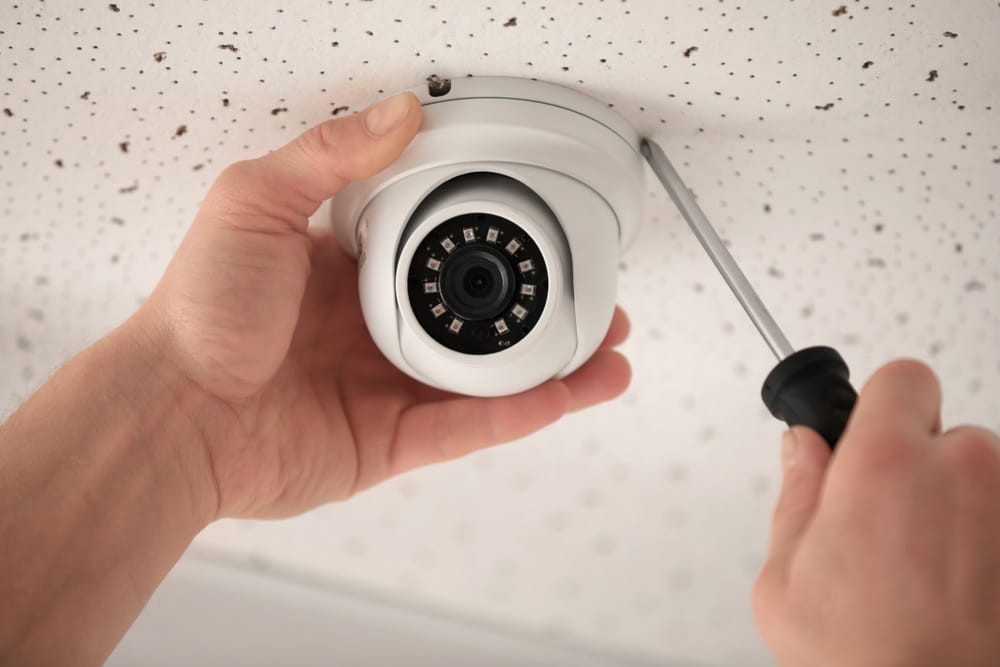
A pet camera is a great way to keep tabs on your kitty while you’re away. Knowing they’re well cared for by a friend or cat sitter is good for your peace of mind, but nothing beats getting to see your kitty with your own eyes. There are tons of pet cameras on the market, and many have extra bells and whistles to really help you connect with your pet while you’re away.
6. Cat-Proof Your Home
Cat-proofing your space before you leave on your trip is a great way to prevent those “Oh my gosh, did I leave the stove on?” moments. The last thing you want is for your cat to get themselves into trouble when there’s no one home to supervise them 24/7.
- Tie up blind and curtain cords to prevent entanglement and strangulation.
- Move houseplants to a cat-free area to prevent accidental ingestion of potentially toxic materials and to protect your plants.
- Keep interior doors blocked open with heavy objects or shut to prevent your kitty from locking themselves in a room.
- Unplug electrical cords.
Think about other potential hazards in your home that you know your cat has gotten into in the past. For example, we have a gas stove with handles on the front and buttons on the top to turn the stove and range on and off. Several times, when our cats are particularly naughty, they’ve turned the stove on and off by stepping on the buttons and have even stepped on the knobs for the cooktop, too. Call me paranoid (my husband does!), but I keep the stove “locked” at all times to ensure the cats can’t turn it on, and when we leave on vacation, I make sure I pull off all the knobs on the range so they can’t accidentally turn the gas on the stovetop, either.
7. Consider Installing a Diffuser
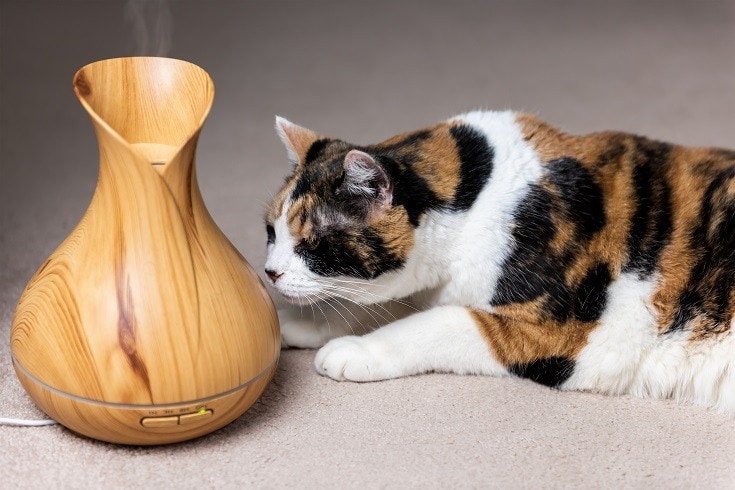
If your kitty is prone to separation anxiety in your absence, you might consider investing in a diffuser while you’re away. Most of these plug in diffusers work by releasing a synthetic cat pheromone, designed to mimic calming scents that help cats relax and feel less stressed. Take note of the square footage of your home, as you may need more than one diffuser to help keep your pet’s mood stable and relaxed. You’ll also want to plug in the diffuser a few days prior to your departure to ensure they’ve had time to take effect.
8. Leave Something Behind
Your cat is probably in love with your scent, so consider leaving an article of clothing out near your cat’s favorite spots in your home so they can always have you “with” them. Even in your absence, your scent will provide reassurance for your pet.
If you’re going away for an extended period, you might also leave items with your scent in sealed bags for your caretaker to place out every day you’re gone.
9. Invest in Automatic Feeders
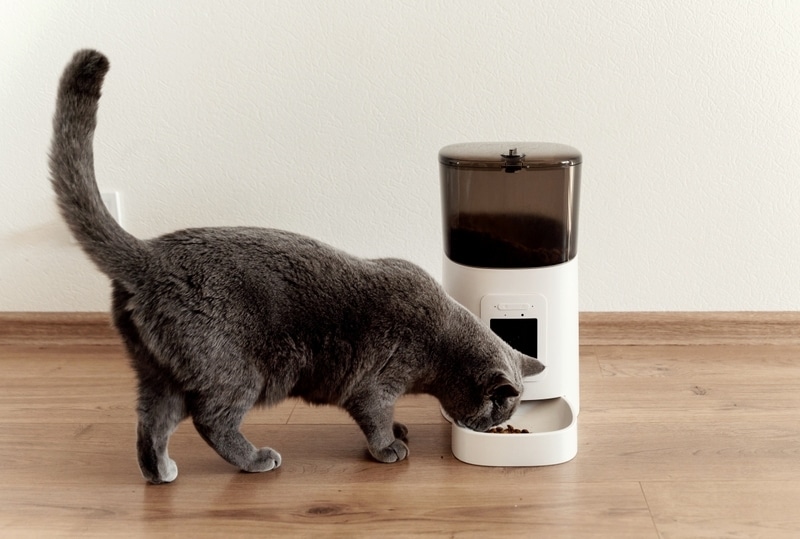
If you don’t have the budget to have a pet sitter come three times a day to feed your pets, you should consider investing in an automatic feeder. These awesome devices are a great way to ensure your kitty is fed at the appropriate times in the proper quantities in your absence.
We have feeders for each of our five cats that we set up to go off at breakfast and lunchtime. When we go away on vacation, we hire a pet sitter to come once daily to feed them soft food in the evening and to handle litter box duties, too.
10. Ask for Updates
Regardless of who is caring for your pets, ask them to keep in touch via text or email, preferably with photos, so you know that all is well while you’re away. Our cat sitter is great at keeping us in the know and even sent pictures of the destroyed automatic cat feeder my cats pushed down the stairs. This is the kind of content I need to know about when I’m away. Even though I can’t do anything about a broken feeder while I’m thousands of miles from home, it’s nice to know that my cats are keeping our cat sitter on her toes.
11. Leave Lots of Toys Out
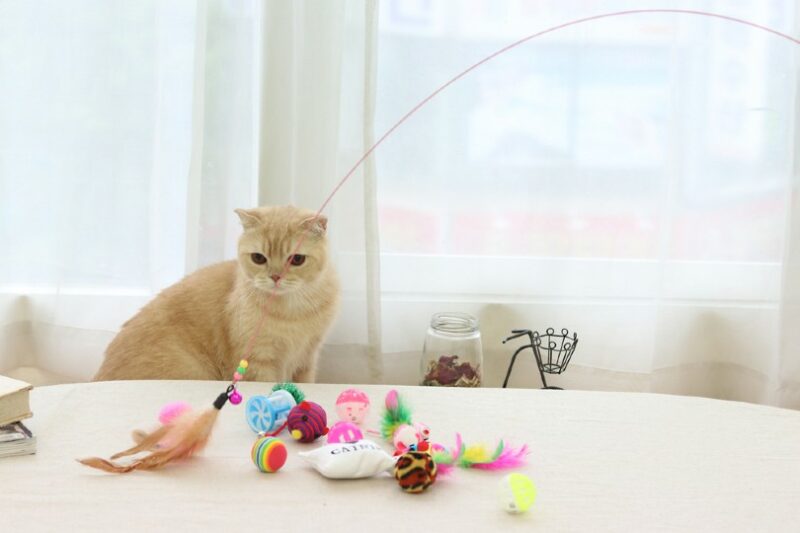
Make sure your cat has a lot of activities they can do in your absence to keep themselves entertained and out of trouble. Put tall cat trees by their favorite windows and leave out a fun puzzle toy for your caretaker to fill during their visits. You’ll want to ensure the toys you leave out are completely safe and won’t lead to accidental ingestion or entanglement. These types of toys are supervision-only and can be kept in a safe place for your caretaker to access when they come to visit.
12. Leave Some Background Noise
If your home is usually a busy place, with lots of noise and people coming and going, it may be in your pet’s best interest to leave some background noise on while you’re away. You might consider leaving a radio station playing in your absence.
Final Thoughts
It’s normal to feel worried about your kitty while you’re away, but you shouldn’t let your worries hold you back from living your life to the fullest. Whether you’re leaving cats alone for four days, seven days, two weeks, or more, know that it’s totally possible with the right loving and responsible caregiver. With our tips above, you’ll be able to enjoy your time away without worrying too much about the health and safety of your little buddy, who will be snug as a bug at home, anxiously awaiting your return.
Featured Image Credit: Aziz Acharki, Unsplash
Contents
- The 12 Holiday Cat Care Tips
- 1. Determine the Level of Care Required
- 2. Choose the Right Facility
- 3. Choose the Right Pet Sitter
- 4. Write Detailed Instructions
- 5. Set Up Pet Cameras
- 6. Cat-Proof Your Home
- 7. Consider Installing a Diffuser
- 8. Leave Something Behind
- 9. Invest in Automatic Feeders
- 10. Ask for Updates
- 11. Leave Lots of Toys Out
- 12. Leave Some Background Noise
- Final Thoughts

